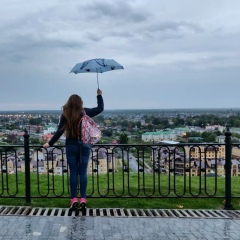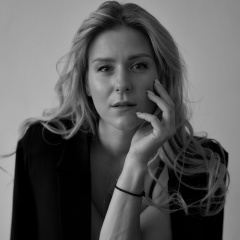Несколько лет к ряду я смотрю в марте-апреле "Семнадцать мгновений весны".
Первая серия начинается со сцены, которой у автора Юлиана Семенова в романе не было: ранней весной Штирлиц стоит в лесу и долго смотрит под первые звуки "Я прошу" на летящих по небу журавлей, он приехал в этот лес с его другом, старушкой фрау Заурих.
Долгие кадры, долгие планы, долгие взгляды, глубокие взгляды. Камера не спешит, как не спешит и герой. Как не спешит и голос за кадром.
Ткань этого кино завораживает, окутывает, обволакивает. Музыка обращает к многослойному переживанию. Отстроенный черно-белый кадр обладает достоинством и кажется роскошным в своей неспешности.
Я каждый раз испытываю наслаждение при просмотре этого кино.
На этой неделе я начала читать книгу. И открыла для себя ещё одну грань искусства этой картины: она во всём своем продолжении сохраняет ритм. С книгой это стало очевидней. Мастерством режиссера ритм книги, её строгость, выверенность словесных структур, преобразились в ритм кино.
Наслаждаюсь слогом. Кружево слов.
"Романс окончился тихим фортепианным проигрышем. Далекий голос московского диктора, видимо, немца, начал передавать частоты, на которых следовало слушать передачи по пятницам и средам. Штирлиц записывал цифры: это было донесение, предназначенное для него, он ждал его уже шесть дней. Он записывал цифры в стройную колонку: цифр было много, и, видимо, опасаясь, что он не успеет все записать, диктор прочитал их во второй раз.
А потом снова зазвучали прекрасные русские романсы. Штирлиц достал из книжного шкафа томик Монтеня, перевел цифры в слова и соотнес эти слова с кодом, скритым среди мудрых истин великого и спокойного французского мыслителя.
"Кем они считают меня?" - подумал он. - Гением или всемогущим? Это же немыслимо..."
Юлиан Семенов, "Семнадцать мгновений весны"
Первая серия начинается со сцены, которой у автора Юлиана Семенова в романе не было: ранней весной Штирлиц стоит в лесу и долго смотрит под первые звуки "Я прошу" на летящих по небу журавлей, он приехал в этот лес с его другом, старушкой фрау Заурих.
Долгие кадры, долгие планы, долгие взгляды, глубокие взгляды. Камера не спешит, как не спешит и герой. Как не спешит и голос за кадром.
Ткань этого кино завораживает, окутывает, обволакивает. Музыка обращает к многослойному переживанию. Отстроенный черно-белый кадр обладает достоинством и кажется роскошным в своей неспешности.
Я каждый раз испытываю наслаждение при просмотре этого кино.
На этой неделе я начала читать книгу. И открыла для себя ещё одну грань искусства этой картины: она во всём своем продолжении сохраняет ритм. С книгой это стало очевидней. Мастерством режиссера ритм книги, её строгость, выверенность словесных структур, преобразились в ритм кино.
Наслаждаюсь слогом. Кружево слов.
"Романс окончился тихим фортепианным проигрышем. Далекий голос московского диктора, видимо, немца, начал передавать частоты, на которых следовало слушать передачи по пятницам и средам. Штирлиц записывал цифры: это было донесение, предназначенное для него, он ждал его уже шесть дней. Он записывал цифры в стройную колонку: цифр было много, и, видимо, опасаясь, что он не успеет все записать, диктор прочитал их во второй раз.
А потом снова зазвучали прекрасные русские романсы. Штирлиц достал из книжного шкафа томик Монтеня, перевел цифры в слова и соотнес эти слова с кодом, скритым среди мудрых истин великого и спокойного французского мыслителя.
"Кем они считают меня?" - подумал он. - Гением или всемогущим? Это же немыслимо..."
Юлиан Семенов, "Семнадцать мгновений весны"
For several years in a row I watch in March-April, "Seventeen Moments of Spring."
The first series begins with a scene that the author Julian Semenov didn’t have in the novel: in early spring Stirlitz stands in the forest and looks at the first sounds “I ask” for cranes flying across the sky for a long time, he came to this forest with his friend, old lady Frau Zaurich .
Long shots, long plans, long looks, deep looks. The camera is in no hurry, just as the hero is not in a hurry. How not in a hurry and voiceover.
The fabric of this movie is mesmerizing, enveloping, enveloping. Music turns to a multi-layered experience. The rebuilt black and white frame has dignity and seems luxurious in its leisurely.
Every time I enjoy watching this movie.
This week I started reading a book. And she discovered for herself another facet of the art of this picture: in all its continuation, it maintains a rhythm. With the book, this became more apparent. By the skill of the director, the rhythm of the book, its severity, and the accuracy of verbal structures, were transformed into the rhythm of the movie.
I enjoy the syllable. Lace words.
“The romance ended in a quiet piano loss. The distant voice of the Moscow announcer, apparently a German, began to transmit frequencies at which they should listen to programs on Fridays and Wednesdays. Stirlitz wrote down the numbers: this was a message intended for him, he had been waiting for him for six days. He He wrote down the numbers in a slender column: there were a lot of numbers, and apparently fearing that he would not have time to write everything down, the announcer read them a second time.
And then again, beautiful Russian romances sounded. Stirlitz took a volume of Montaigne from a bookcase, translated the numbers into words and correlated these words with a code hidden among the wise truths of a great and calm French thinker.
"What do they consider me?" he thought. - Genius or omnipotent? This is unthinkable ... "
Julian Semenov, "Seventeen Moments of Spring"
The first series begins with a scene that the author Julian Semenov didn’t have in the novel: in early spring Stirlitz stands in the forest and looks at the first sounds “I ask” for cranes flying across the sky for a long time, he came to this forest with his friend, old lady Frau Zaurich .
Long shots, long plans, long looks, deep looks. The camera is in no hurry, just as the hero is not in a hurry. How not in a hurry and voiceover.
The fabric of this movie is mesmerizing, enveloping, enveloping. Music turns to a multi-layered experience. The rebuilt black and white frame has dignity and seems luxurious in its leisurely.
Every time I enjoy watching this movie.
This week I started reading a book. And she discovered for herself another facet of the art of this picture: in all its continuation, it maintains a rhythm. With the book, this became more apparent. By the skill of the director, the rhythm of the book, its severity, and the accuracy of verbal structures, were transformed into the rhythm of the movie.
I enjoy the syllable. Lace words.
“The romance ended in a quiet piano loss. The distant voice of the Moscow announcer, apparently a German, began to transmit frequencies at which they should listen to programs on Fridays and Wednesdays. Stirlitz wrote down the numbers: this was a message intended for him, he had been waiting for him for six days. He He wrote down the numbers in a slender column: there were a lot of numbers, and apparently fearing that he would not have time to write everything down, the announcer read them a second time.
And then again, beautiful Russian romances sounded. Stirlitz took a volume of Montaigne from a bookcase, translated the numbers into words and correlated these words with a code hidden among the wise truths of a great and calm French thinker.
"What do they consider me?" he thought. - Genius or omnipotent? This is unthinkable ... "
Julian Semenov, "Seventeen Moments of Spring"
У записи 9 лайков,
0 репостов,
348 просмотров.
0 репостов,
348 просмотров.
Эту запись оставил(а) на своей стене Даша Чамкина






























